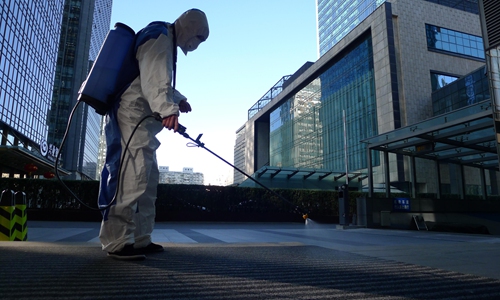HOME >> CHINA
Beijing virus concerns as workers return
By Liu Xin and Liu Caiyu Source:Global Times Published: 2020/2/21 21:53:40

A sanitation worker sprays disinfectant in a public area in Beijing. Photo: cnsphoto
Xicheng district of China's capital city Beijing released three consecutive messages to dismiss rumors on Friday after two hospitals in the district reported cluster infections of the novel coronavirus pneumonia, known as COVID-19. Although the rumors were dismissed, experts said the capital is facing more challenges in dealing with the epidemic from the huge return of migrant workers and resumption of work.
Rumors saying 52 of 69 people who had been put in quarantine in Xicheng district were confirmed with COVID-19, a telecommunication company in Jinrong street had cluster infection, and patients were infected in the China Academy of Chinese Medical Sciences Xiyuan Hospital were spread online.
The Xicheng government denied these rumors, saying that among the 69 people who were quarantined, 41 had been released from medical observation. There was no cluster infection in Xicheng or at any company on Friday, and the China Academy of Chinese Medical Sciences Xiyuan Hospital had no confirmed cases.
The rumor came after news reports said that as of Thursday, Fuxing Hospital in Xicheng district had 36 confirmed cases and Peking University People's Hospital also in Xicheng district had three confirmed cases. A total of 164 people, including medical staff at Peking University People's Hospital who have had close contact with the patients, have been put under close medical observation.
Beijing reported one confirmed case on Friday. As of Thursday midnight, the municipality had 396 confirmed cases, among which Haidian district had 61, Chaoyang district 58 and Xicheng district 53.
Zhang Yiwu, an expert at Peking University, told the Global Times that there are some uncertainties for controlling the epidemic, given the huge flow of migrant workers returning to Beijing and the resumption of work for many companies. The confirmed cases found in two hospitals may have infected others.
Beijing has been requiring people returning from other places to have a 14-day-long indoor quarantine since February 14.
The daily commute of many people by subway and other public transportation may also increase the possibility for being infected by unknown carriers with COVID-19, an expert on public health based in Beijing told the Global Times Friday.
Zhang also noted that many of Beijing's medical resources have shifted to support Wuhan, which may put more pressure on local medical staff. But Beijing still has abundant medical resources, which make the epidemic situation controllable.
Medical staff reached by the Global Times on Friday confirmed that many hospitals in Beijing have taken more measures to prevent a potential explosion of cross infections for COVID-19 within hospitals.
A photo sent to the Global Times by a doctor from the People's Hospital showed that a doctor who offered outpatient service used googles and wore full protective outfits.
A medical staff from Peking Union Medical College Hospital told the Global Times that the hospital has limited the number of patients. Certain departments announced a suspension of outpatient services.
Beijing's first "Fang Cang" shelter room for CT examination, which is 50 meters from the fever clinic of Beijing Chaoyang Hospital, was put into operation on Friday. It could increase the efficiency of screening patients with fever and avoid cross infection inside the hospital, the Beijing News reported.
Companies which apply for resumption of work need to take more measures to ensure employees' safety, and residential communities in Beijing should also strengthen management. "We should make full preparations and keep alert for changes. But the situation in Beijing remains controllable," Zhang said.
Some residential communities near the Fuxing Hospital and Peking University People's Hospital in Xicheng district, as well as other communities in the nearby Haidian district, also strengthened efforts to manage the flow of people, including giving permit cards to residents."Beijing's daily additional confirmed cases remain less than 10 since February 13, which showed a success in the prevention work. But we cannot relax. As the capital of China, Beijing has played a significant role in preventing the virus," Zhang Qiang, an official of Beijing's prevention working group, told a press conference on Friday.
"Beijing has gained experience from dealing with SARS in 2003. Although we cannot say Beijing is totally safe in dealing with the coronavirus outbreak, it is capable of preventing an epidemic outbreak. Beijing will not become another Wuhan," Wang Hongwei, a professor at Renmin University's School of Public Administration and Policy, told the Global Times Friday.
RELATED ARTICLES:
Posted in: SOCIETY,CHINA FOCUS